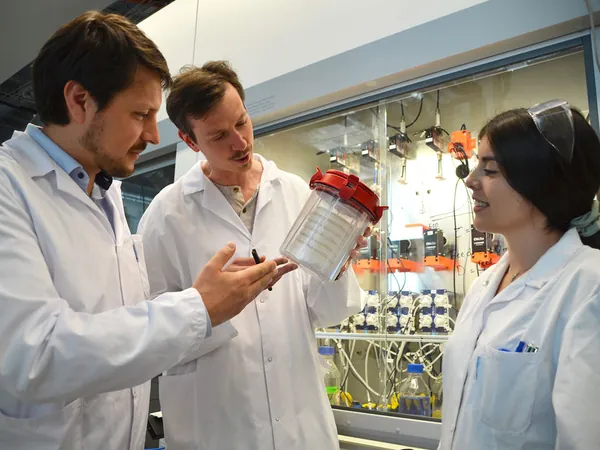
Breakthrough in Parkinson's Research: Targeting a Key Enzyme Offers Hope for Treatment
2025-04-24
Author: Mei
Exciting new research has unveiled a crucial enzyme fueling certain forms of Parkinson's disease, paving the way for potential groundbreaking treatments. This discovery sheds light on how blocking this enzyme can restore normal function in both animal and cell models.
Unmasking the Culprit: Alpha-Synuclein and Neurodegeneration
As Alzheimer's and dementia have made headlines, Parkinson's disease stands out for its unique challenges. A notorious feature of Parkinson's is the accumulation of a protein called alpha-synuclein, which clusters into toxic formations known as Lewy bodies within nerve cells. This buildup interrupts normal cellular functions, ultimately leading to the death of these crucial brain cells.
The Autophagy Connection: Reversing Toxic Build-Up
Our bodies attempt to fight this toxic buildup through a process called autophagy, which involves breaking down and recycling damaged components. Unfortunately, this protective mechanism falters in Parkinson's, preventing the effective disposal of harming alpha-synuclein.
A Promising Discovery: The Enzyme ACLY
Under the leadership of Dr. Sung Min Son at the UK Dementia Research Institute, researchers discovered that the enzyme ACLY is hyperactivated in Parkinson's disease. By examining human brain cells and specialized brain organoids, as well as testing on zebrafish and mouse models, the team found that excess alpha-synuclein triggers the overactivation of ACLY.
Turning the Tide: Blocking ACLY to Restore Functionality
The results were groundbreaking: by inhibiting ACLY, researchers successfully restored normal autophagy and significantly reduced toxic alpha-synuclein levels across various models. This intervention not only diminished the harmful effects of alpha-synuclein but also rejuvenated cellular function.
Paving the Path for New Treatments
Several existing compounds capable of inhibiting ACLY have already been identified, including hydroxycitrate, known for its controversial use in weight loss. However, a major hurdle remains: these compounds cannot cross the blood-brain barrier. Therefore, the next stage of research will focus on developing a specialized ACLY inhibitor that can effectively reach the brain.
A Beacon of Hope for Parkinson's Patients
Prof. David Rubinsztein emphasized the significance of this research, stating, "ACLY acts like a switch, triggering changes in brain cells that are crucial to the progression of Parkinson's. By blocking ACLY, we were able to reverse many of these changes across multiple models. This suggests that the issues caused by alpha-synuclein extend beyond the protein itself to how it disrupts other cellular processes. Our findings highlight ACLY as a promising drug target for future therapies, potentially halting or even reversing the course of this debilitating condition."
With this tantalizing breakthrough, the future of Parkinson's treatment may be on the horizon, offering hope to millions affected by the disease.



 Brasil (PT)
Brasil (PT)
 Canada (EN)
Canada (EN)
 Chile (ES)
Chile (ES)
 Česko (CS)
Česko (CS)
 대한민국 (KO)
대한민국 (KO)
 España (ES)
España (ES)
 France (FR)
France (FR)
 Hong Kong (EN)
Hong Kong (EN)
 Italia (IT)
Italia (IT)
 日本 (JA)
日本 (JA)
 Magyarország (HU)
Magyarország (HU)
 Norge (NO)
Norge (NO)
 Polska (PL)
Polska (PL)
 Schweiz (DE)
Schweiz (DE)
 Singapore (EN)
Singapore (EN)
 Sverige (SV)
Sverige (SV)
 Suomi (FI)
Suomi (FI)
 Türkiye (TR)
Türkiye (TR)
 الإمارات العربية المتحدة (AR)
الإمارات العربية المتحدة (AR)